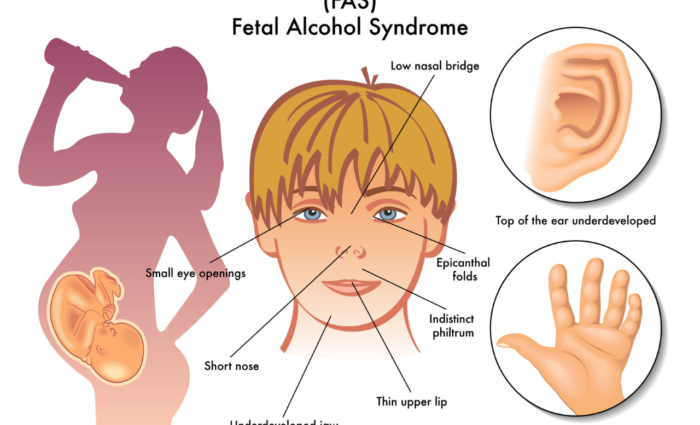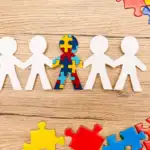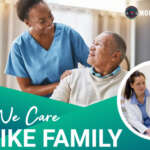MoHCS Spotlight: Fetal Alcohol Spectrum Disorder (FASD)
After Lynette Blaisman adopted Ed as a newborn baby, he was diagnosed with Fetal Alcohol Spectrum Disorder (FASD). She shared with DODD about the disorder, what is helpful for supporting a person with FASD, and what is most important to know about it. Jeb Hall, Ed’s support staff, also shared information from his perspective. The Rehabilitation Community Support Service (RCS) helps Ed meet personal goals and provides care.
What is FASD and what are the common features? 
Lynette: “Fetal alcohol spectrum disorder is an umbrella term that includes a lot of diagnosis underneath it. In Ed’s case, he has FAS which is fetal alcohol syndrome.”
Some common characteristics of FASD include:
- Facial features
- Growth challenges
- Temporal central nervous system abnormalities
- Confirmed maternal alcohol use
- Wide range of features
How to get help?
Children under the age of three who are diagnosed with FASD are automatically eligible for Early Intervention. Ohio Early Intervention is a statewide system that provides coordinated services to parents of infants and toddlers with disabilities or developmental delays in Ohio. “EI is grounded in the philosophy that young children learn best from familiar people in familiar settings. Every family served in EI will have a local EI team that consists of a service coordinator, service providers, and your family. The referral process is simple. Call 1-800-755-GROW or go online to ohioearlyintervention.org.
What is it like to be a mother of a child with FAS?
Lynette: “I think for us, the biggest challenge, to begin with, was not even being aware that there was such a thing. There were behaviors early on, but we didn’t know what they were, what to attribute them to. So we did not do a great job of seeking out early intervention.
Some kids do better in a really high structured setting and that kind of was our normal to begin with. We also had a very strong family. We had grandparents on both sides that could step in. We had a very strong church family, so that made a big difference because we, you know, we could rely on them.”
Is there anything you would say to encourage others who may have recently found out that they will have a child with FAS?
Lynette: “Never give up. I can say honestly some of our most challenging seasons of our life we’re because of Ed. And our fondest memories and experiences were because of Ed. It’s all those things and it’s such an adventure.”
Jeb Hall: “Please understand there’s going be tough days, but it’s a new day tomorrow and guess what? You learn something that might not have worked so well. You’re going to have very tough moments. You’re going to have amazing moments.”
Why is it important to raise awareness about FAS?
Ed: “Simple stuff like just me and school and being around church, it was difficult for me because I couldn’t quit keep up.
Alt. Ed explained during the interview that some environments were difficult for him growing up because it was hard for him to keep up with the learning and many teachers were not equipped with the right information for how to help him, further emphasizing the need for education about FASD.
Lynette: “Abilities are all over the place, and that’s something that is frustrating to other people because if you can do that, then you certainly should be able to do this. And that’s not necessarily true with this diagnosis.”
What are things caregivers should consider for people on the FASD Spectrum?
Jeb: “This is who he is and this is what he needs. That will never change. So someone that’s dealing with, you know, a syndrome like that, please understand that that’s who they are and you’re not going to be able to, change and meet here or do this and do that. You’re not going to get a magic pill and it’s going to be fixed. It’s not.”
There are basic supports that are needed to keep people on the FASD Spectrum safe, and once you figure that out, that’s the direction you stay in, cause the more you change, the more harm you do. So, stick with the direction that you’re going in and get the support that you need and from whatever facility wherever you’re at. But please understand that that’s the direction you go and that’s what we work with.”
Is there anything else that you want to tell people about living with FAS?
Lynette: “You have to think outside the box. It’s just being creative and figuring out how you’re going to get him unstuck of how he thinks it’s going to be. It’s hard and it’s frustrating and it’s glorious and funny and hilarious, and it’s all those things.”
“It’s 100% preventable and I think that is one of the reasons that we need to talk about it. We know why this happens and we can stop it. So, I think that that’s really important. I don’t believe that anybody deliberately chooses to have a negative impact on their baby’s brain. No one does that. But you don’t know what you don’t know. And if you don’t realize the dangers of alcohol during the pregnancy.”
Source: DODD





